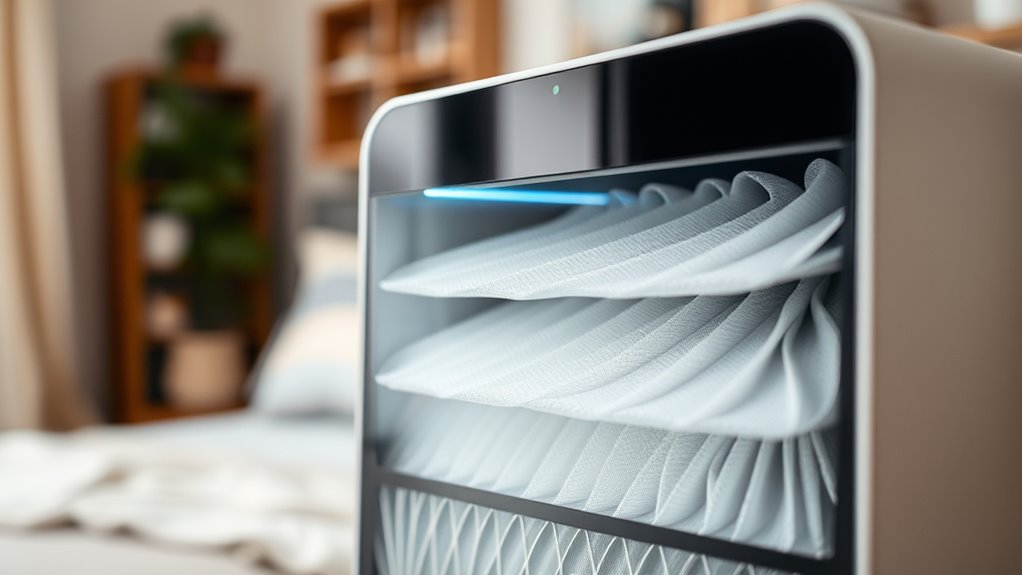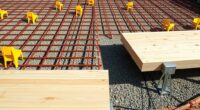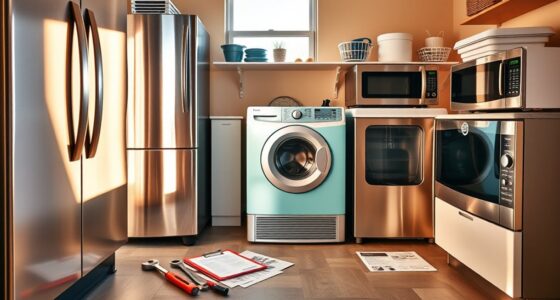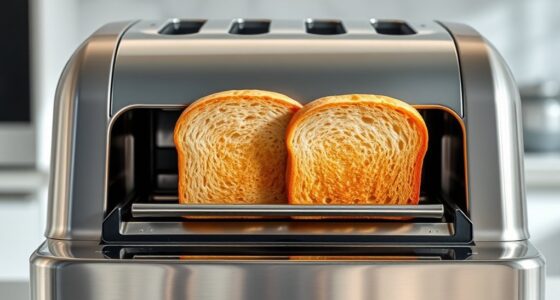MERV filters in home air purifiers help trap airborne particles like dust, pollen, pet dander, and bacteria, improving your indoor air quality. Higher MERV ratings mean the filter can catch smaller particles and offer better protection, especially if you have allergies or asthma. However, more efficient filters may require more frequent maintenance to avoid reduced airflow. Keep exploring to discover how selecting the right MERV rating can boost your home’s air cleanliness and system performance.
Key Takeaways
- MERV filters measure a filter’s ability to capture airborne particles, with higher ratings trapping smaller contaminants.
- They improve indoor air quality by removing dust, pollen, pet dander, and some bacteria from the air.
- Higher MERV ratings offer better filtration but may require more frequent replacement due to clogging.
- Choosing the right MERV rating balances effective filtration with maintaining proper airflow in home systems.
- Regular filter maintenance ensures optimal performance, air quality, and prolongs the lifespan of your air purifier or HVAC system.

If you’re looking to improve your home’s air quality, understanding MERV filters is a great place to start. MERV, which stands for Minimum Efficiency Reporting Value, measures how effectively a filter captures airborne particles. The higher the MERV rating, the better the filter is at trapping dust, pollen, pet dander, and even some bacteria. Knowing this helps you choose the right filter for your needs, balancing air filter efficiency with your specific environment. For example, if you or someone in your household suffers from allergies or asthma, opting for a higher MERV rating can make a noticeable difference in air cleanliness. However, it’s important to contemplate maintenance requirements too. Higher-rated filters tend to trap more particles, which means they can become clogged faster, requiring more frequent replacements or cleanings. Neglecting this can lead to reduced airflow and strain on your air purifier or HVAC system, ultimately decreasing its lifespan and efficiency.
Understanding how air filter efficiency relates to maintenance is key to keeping your system running smoothly. A filter that’s too restrictive can hinder airflow, forcing your system to work harder and use more energy. Conversely, a filter with a low MERV rating might not capture enough particles, defeating the purpose of filtering in the first place. Striking the right balance depends on your home’s specific needs and the manufacturer’s recommendations. Regularly checking your filter and replacing it when it becomes dirty is essential for maintaining optimal air filter efficiency. Many filters are designed for a certain lifespan—often around three to six months—but this can vary based on usage, air quality, and the presence of pets or smokers. Ignoring these maintenance requirements can lead to decreased indoor air quality and increased energy costs.
Additionally, consider how easy or difficult it is to replace or clean your filters. Some MERV filters are disposable and straightforward to swap out, while others may be reusable and require periodic cleaning. Staying consistent with these maintenance routines ensures your air purifier continues to operate at peak performance. Remember, a clean filter not only improves air quality but also preserves your system’s lifespan. By understanding both the air filter efficiency and the maintenance needs associated with different MERV ratings, you can make smarter decisions that keep your home’s air fresh and healthy while optimizing your system’s longevity. It’s also beneficial to select filters that are compatible with professional-grade filters for enhanced protection when needed.
Frequently Asked Questions
How Often Should I Replace My MERV Filters?
You should replace your MERV filters every 3 to 6 months, depending on your filter’s lifespan and your home’s air quality. If you notice reduced airflow or increased dust, it’s time for a replacement. Regularly checking your filters guarantees peak performance. Keep in mind, higher-efficiency filters may need more frequent replacement, so stay attentive to signs of dirt buildup and follow the manufacturer’s recommended replacement frequency.
Are Higher MERV Ratings Better for Allergy Sufferers?
Yes, higher MERV ratings are better for allergy sufferers because they capture smaller particles like pollen, pet dander, and dust mites. Just make certain your air purifier is HEPA compatible, as HEPA filters provide the highest level of filtration. Keep in mind, higher MERV filters may require more frequent filter maintenance, so check your unit’s guidelines to maintain peak performance and breathe easier.
Can MERV Filters Remove Viruses From the Air?
Think of MERV filters as gatekeepers, but they’re not superheroes against viruses. They can trap some airborne viruses through virus filtration, especially higher-rated MERV filters, yet they don’t guarantee complete removal. To maintain their effectiveness, you need to replace filters regularly, as filter lifespan shortens with heavy use. Keep in mind, while helpful, MERV filters aren’t foolproof shields against all airborne viruses.
Do MERV Filters Affect Airflow and HVAC Efficiency?
Yes, MERV filters can affect airflow and HVAC efficiency. As they capture particles, they create airflow restrictions, which may reduce the system’s overall airflow. This can lead to increased energy consumption because your HVAC has to work harder to circulate air. To avoid efficiency issues, choose a MERV filter rated appropriately for your system, and replace it regularly to maintain peak airflow and energy use.
Are MERV Filters Suitable for Use in All Home Air Purifiers?
Think of MERV filters as versatile, yet not universal, tools for your home air purifier. While they offer excellent filtration, their filter compatibility varies, and installation requirements differ among models. Before choosing one, check your purifier’s specifications to guarantee compatibility. If compatible, MERV filters can improve air quality; if not, using the wrong filter might reduce efficiency or damage your device. Always verify specifications before installing a MERV filter.
Conclusion
Now that you know how MERV filters act like vigilant gatekeepers, trapping tiny particles and keeping your air fresh, you can confidently choose the right filter for your home. Think of it as upgrading your home’s invisible shield, turning your space into a sanctuary of clean, breathable air. With these filters working tirelessly like dedicated guardians, you’ll breathe easier, knowing your home is a haven of purity amid the chaos outside.









